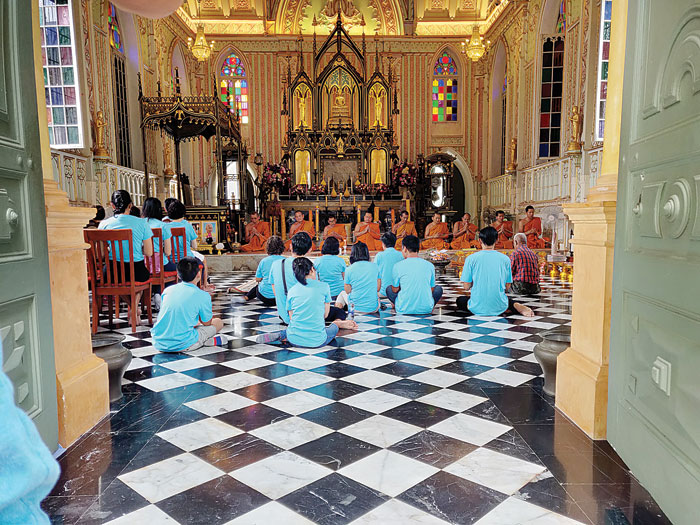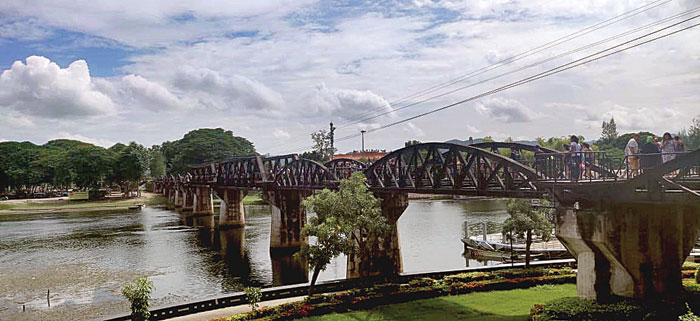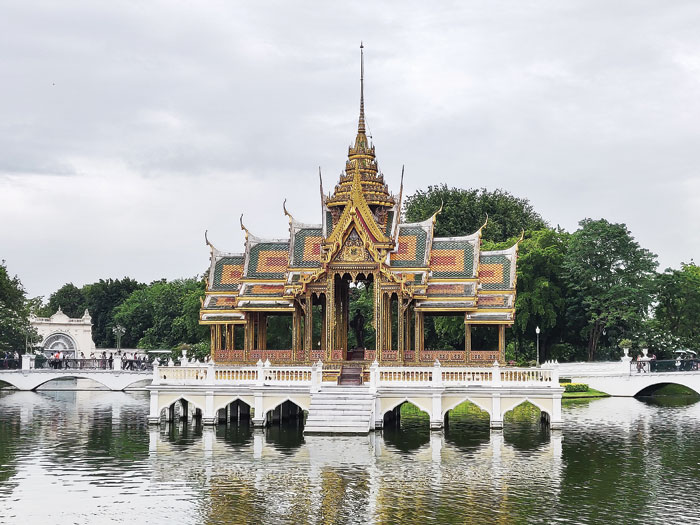When you think of Thailand, you typically think of bustling Bangkok or the touristy Pattaya or the beautiful Phuket. A relatively unexplored part of Thailand is Ayutthaya, the former capital of Thailand, nestled around 65km from Bangkok. Armed with an invitation from the Tourism Authority of Thailand (TAT), Mumbai, and Bangkok Airways for The Association of Southeast Asian Nations (ASEAN) FAM 2019, t2oS recently went to explore the lesser-known parts of Thailand — Ayutthaya and Kanchanaburi — and came back awed. Read on…
Day 1
We took a late-night Bangkok Airways flight from Mumbai and reached Bangkok early in the morning (special mention to the Potato Cajun Chicken that was served on the flight; it was yum!).
The historic city of Ayutthaya was founded in 1350 and was attacked by the Burmese army in 1767 who burned the city to the ground. Today, the ruins of the city and the associated historic towns in the Ayutthaya historical park are listed as a World Heritage Site by UNESCO. It took us around two hours to reach Ayutthaya from Bangkok by road. On our way, we stopped by the beautiful Bang Pa-In Royal Palace — also known as the Summer Palace — on the outskirts of Ayutthaya, just 20 minutes away. It spreads over a huge area — filled with grassy lawns and pretty architecture — that can be leisurely covered while walking around.
The main attractions here were the colourful Chinese-style royal palace and throne room, a bright observation tower and the pretty-looking pavilion constructed in the middle of a pond. There was also a small temple where I had to pick a card that told me my future for that week. It was written in Thai but our good-natured Thai guide Khun Ann translated it for me, much to my elation.
We had to cross a waterbody in a cable car from the palace to reach Wat Niwet Thammaprawat. Built in Gothic Revival style, with stained glass windows and a Gothic altar, this is the only Buddhist temple in Thailand that looks like a church. It was a peaceful sight watching the monks praying inside the temple in complete sync. I was surprised when we were given prasad that was actually a coconut sorbet!
The journey had made all of us extremely hungry, so we headed for lunch at Tonnam Riverview Restaurant in Ayutthaya. Located right on the river on two wooden boats, the restaurant offers a great view along with good food! I particularly enjoyed having the Tom Yum Soup, Som Tam (a green papaya salad), Grilled Prawns and the Thai Green Curry while sipping on fresh coconut water on the side. Post-lunch, we checked into the Kantary Hotel for some much-needed siesta.
In the evening, we headed out for the Ayutthaya Night Market. From food to trinkets to souvenirs to live music — you get everything at a night market in Thailand. Some cute buns caught my eye — they were colourful and were made in the shapes of popular cartoon characters like Doraemon, Spiderman or the Minions. Not only did they look super cute but were also filled with different fillings like vanilla, pork or chocolate!
Also known as the Krungsri Walking Street, this night market opens only Friday to Sunday. I was at my experimental best so I gulped down crickets and silkworm from one of the food stalls. I was scared but trust me, they taste good! If you’re in Thailand and don’t try out something new for the first time then what’s the point, right? We finished the day by having a sumptuous dinner of Chicken Pad Thai, Prawn Papad and River Fish Curry with rice at the Phae Krung Kao Restaurant.

Wat Niwet Thammaprawat was built in the Gothic Revival style with stained glass windows and an altar and is the only Buddhist temple in Thailand that looks like a church. Ushnota Paul
Day 2
It was the day to explore the historical city of Ayutthaya. We started off early morning to visit Wat Maha That that means Temple of the Great Relic. Located on the city island in the central part of Ayutthaya in Tha Wasukri sub-district, Wat Maha That is the royal temple that houses Buddha’s relics. The part of the Ayutthaya Historical Park that was declared a UNESCO World Heritage Site includes — Wat Ratchaburana, Wat Mahathat, Wat Phra Sri Sanphet, Wat Phra Ram and Wiharn Phra Mongkhon Bopit.
The construction of the Wat Maha That’s Main Pagoda (Prang) was started by King Borommaracha I in 1374 and completed in King Ramesuan’s reign. With the fall of Ayutthaya in 1767, the Burmese attacked and set the monastery on fire. The abandoned Pagoda fell in decay during the reign of King Rama VI and today only the symmetrical base with staircases remain.
Walking through these ruins, you’d get lost in history and also feel sad to learn how it was destroyed. Special mention must be made of the iconic Buddha head entwined within the roots of a fig tree in Wat Maha That. No one knows how the Buddha head got entangled in the tree but one theory suggests that the tree simply grew around it during the time this temple remained abandoned.
From here, we rented bicycles and went on a ride till Wat Phra Sri Sanphet. Exploring the heritage park in a bicycle truly took me back to my childhood days, all carefree and happy. Wat Phra Si Sanphet is iconic for the three Stupas (known as Chedis in Thailand). When the Burmese invaded, the entire temple ground was destroyed with the exception of the three Chedis that can be seen even today.
The next stop was the Ayothaya Floating Market. Since it was the king’s mother’s birthday, it was a holiday in Thailand. So despite being a Monday afternoon, the market was packed. The floating markets of Thailand cannot be explained in mere words, they are a different world altogether. Everything from traditional Thai food, sweets, souvenirs, tee-shirts, home decorations, Thai toys... are sold here. I picked up a few souvenirs like fridge magnets and wind chimes for friends and family.
We had lunch at a pretty restaurant called The Summer House and I’ll recommend the Grilled River Prawn and Spaghetti to everyone. For dessert, please try out the Apple Crumbs with Vanilla Ice-cream. Next, our Thai guides Khun Tippy and Khun Ann took us to the home of a skilled craftsman who runs a local handicraft shop from his home. We gathered around the floor as he demonstrated and taught us how to make Thai-style fish mobiles, which is called Pla ta pian. With the help of thin bamboo sheets, we tried to keep up with his swift movements and made one fish each. It felt like we were back to crafts class in school and it was a lot of fun.
Next, we were given a tour of Sala Ayutthaya, a luxury boutique hotel, along the banks of the Chao Phraya River, overlooking the famous Wat Phutthaisawan. With around 6000THB/night rate, Sala Ayutthaya has rooms with a great view of the river, so you can just sip wine and watch the world go by. It was almost evening by now and we were itching to go shopping. So we gathered at the Premium Outlook Mall that houses tons of luxury brands and I ended up buying a lot of clothes!
The day ended in the best way possible, on the Sai Thong Dinner Cruise. This river cruise took us on a leisurely ride in the moonlight as we had our dinner enjoying the beauty of the ancient city. The river prawns were to die for!
Day 3
We left the next morning at around 7.30am for Kanchanaburi, which is around three hours from Ayutthaya. Once there, our first stop was Mallika R.E 124, an ancient village that’s been restored and maintained to its former glory that’ll give you the opportunity to experience what it was like to live in ancient Siam.
You can even rent and dress up in traditional Thai costumes here, complete with a pretty umbrella and ornaments. As you walk around this huge property, you’ll see hand-drawn carriages, people dressed like ancient times selling food, perfumes or trinkets. One of the most interesting things here is that in Mallika Village, only Satang (ancient Thai money) is accepted. So you need to exchange your Thai Baht to Satang at the ticket office. You can buy a ton of things here ranging from food, ancient cosmetics to perfumes and candles. We had our lunch dressed as ancient Thai villagers and that was a lot of fun.
Next, we checked in at River Kwai Village Hotel. It’s a huge property and you can easily spend a whole day doing various activities at the hotel itself. It’s located in a hilly area on upper River Kwai and the room overlooks the beautiful river and tropical forests. We changed into comfortable clothes and went for a fun ATV ride through the Sai Yok National Park and later, bamboo river rafting.
It was a lot of fun but also pretty tiring since our day had started pretty early. So we pampered ourselves at Rock Valley Hot Spring & Fish Spa, which is a part of the hotel’s property. We began by putting a mud Thai mask on our face for 20 minutes. The results were unbelievable — our faces glowed!
We had dinner at the hotel while watching traditional Thai dance and live music performances. The best dish was the Tom Yum Soup served inside a coconut and I’d highly recommend it.

The bridge on the River Kwai Ushnota Paul
Day 4
Early morning, we checked out of the hotel and went to explore the Hellfire Pass Memorial Museum. The Hellfire Pass is the infamous railway cutting on the former Death Railway that connected Thailand and Burma, built during World War II. It’s a reminder of the atrocity by the Japanese army who used forced labour of lakhs of Asian civilians and 61,000 allied prisoners of war (PoW) to build this railway pass — 91,000 civilians and 12,000 PoW died working in those harsh conditions. Once you enter the museum, a small gallery explains the sad history of the site along with video interviews of people who were there. There’s also a small theatre that showcases a 10-minute documentary explaining the history. Behind the museum, you have to descend a long set of stairs to reach the trail that follows the original rail bed.
With the audio guide plugged in, we trekked through this trail as I could feel my heart thump hard. The more I learnt about Thailand’s sad past, the heartbreaking stories of the people who died every day in the very spot we were walking in, the more my heart broke. It’s said that at night when they used to work, the torchlight would create eerie shadows of the Japanese guards and the prisoner’s faces that used to resemble scenes from hell — hence the name.
It was a heavy afternoon for all of us so we broke for a quick lunch and followed it up with buying a few souvenirs from the shops lined up at the railway station. We were taking a train to the iconic ‘bridge on the river Kwai’! I took a window seat and spent the ride contemplating about the history we just learnt about. The famous 1957 war film The Bridge on the River Kwai had used the same historical setting of the construction of the Burma Railway in 1942-43 and that makes this a favourite tourist spot. The bridge on the river Kwai escaped planned bombing and till today remains a functioning railway bridge over which trains pass daily. If you love history, take a break from the usual Bangkok partying for a day or two and visit the Hellfire Pass Museum and take a train ride to The Bridge on the River Kwai in Kanchanaburi. I promise you’d view life a bit differently after this visit.
Our next stop was Wat Tham Sua or the Tiger Cave Temple. You have to climb 157 steep steps to reach the top, so if you’re feeling lazy, simply opt for the cable car service. Once you reach the top, the giant Buddha covered with gold mosaic work is a sight to behold. The temple was apparently named after a small limestone cave that was once home to tigers! People come to Wat Tham Sua to worship and place sheets of gold leaf on statues to get their wishes fulfilled. There’s a Chedi beside the Buddha statue — once you make your way up inside the Chedi, you can enjoy a panoramic view of the city where lush green fields stretch far into the horizon.
It was nearing sunset, so we headed to watch it from a super pretty cafe called Meena Cafe. I sat beside the window with a Thai Iced Tea in my hand and watched the lush green paddy fields stretching far and wide. Apart from offering the most amazing view of the sunset, this cafe will also give you some great Instagrammble spots. So if you’re in Kanchanaburi, don’t forget to visit it.
That night, we checked into the prettiest looking hotel called Villa la Flora. Each room was named after a different flower and the property honestly looked like a real-life doll house. Inspired by Greco-Roman architecture, our room overlooked the pool. The pretty white walls, for a moment, made me feel as if I’m in Santorini, Greece. For dinner at the hotel restaurant, I’d recommend the Pork Fried Rice; it was delicious. I wish we had more time to spend at this property but it was our last day in Thailand.
Day 5
It was time to leave. It took us three hours to reach Bangkok airport in the morning. I’ll fondly remember this trip because it showed me a side of Thailand’s history and culture that I had never seen before. So the next time you plan your luxurious Phuket or Krabi itinerary, do give these two ancient Thailand gems a shot! I promise you won’t regret it!











